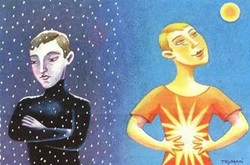
Yesterday I left my office at around 6:00 PM, and it was already getting dark. I'm very glad to have windows in my office to get that natural light in, but man, stepping outside into that darkness when it had been just part of the afternoon a month ago is quite a change. This lack of daylight can feel like a downer because, well, it is.
We're biologically tuned to be awake and searching for food during our daytime hours and to sleep during the nighttime ones. Unfortunately, our work schedules and school bus arrival times don't really care about that. A lack of sunlight can lead to a lot of negative feelings, including the Winter Blues, and today we're gonna talk about how to recognize it and what to do about it, whether it's you or a loved one.
We're biologically tuned to be awake and searching for food during our daytime hours and to sleep during the nighttime ones. Unfortunately, our work schedules and school bus arrival times don't really care about that. A lack of sunlight can lead to a lot of negative feelings, including the Winter Blues, and today we're gonna talk about how to recognize it and what to do about it, whether it's you or a loved one.
I don't care if you're an early riser; when it's dark, you want to sleep, so you're going to feel tired. We know that when you're tired, you're more irritable and sensitive, and you're probably not looking the way that you want to. Things just generally are more annoying than they are once you get your day going, but getting your day going involves light. The biggest and most natural source of light? Not your office flickering fluorescent lights that double as a hum machine, not that jerk in front of you who won't turn off his high-beams. No, the source of light that we really need comes from the sun. Again, something that most offices and schools ignore.
When we don't get this light, much like your parents during your first semester of college, we miss it more than we thought we would. It can bring us down and even cause depression. While those who experience this, often called the Winter Blues but clinically referred to as Seasonal Affective Disorder, tend to have it annually, it's possible for it to spring up when you haven't felt it before. And yes, children can experience this as well.
There are people who can experience Seasonal Affective Disorder, or SAD (yes, I'm serious, it's really called that), and not have symptoms of depression other times of the year, so it can be hard for them to recognize. It's a general feeling of a lack of motivation, less interest in things that you used to enjoy, feelings of loneliness or hopelessness, irritability, less energy, difficulty focusing, weight gain, increased anxiety, needing more sleep than usual, a decreased libido (yes, you know that one was coming!) and/or deteriorating relationships with friends or family.
While none of these by themselves necessarily mean that it's due to SAD, a combination of them can be a pretty good indicator to give me a call or shoot me an e-mail just to bounce it off me as it's way more common than you think. When you're experiencing SAD, it can also stir up other things that may be going on, like performance in school or at work as well as with your significant other. Better to be safe than sorry and nip it in the bud so that you can stay on track and plow through these colder and darker months, both figuratively and literally.
Some products out there can actually help, like light boxes ( click here for an article by the Mayo Clinic discussing how to go about deciding if it's right for you and how to use it properly ). Of course talk to your doctor before starting anything (just as you would if you were starting a new exercise routine, but don't worry, this one can literally involve you just sitting there!). Even without SAD, they can help you wake up in the morning just like the sun does in the brighter months (when I forget to pull down the shades, which is always). There are also daylight-simulating lightbulbs in many stores. While there's not much research as to whether or not they can help, it is important to make sure that you get as close to natural light as possible. And yes, unfortunately these feelings of depression due to SAD are usually there during the few daytime hours as well. Until you work on it, of course.
While these products can help, they're best used when attacking SAD directly, and one of the best ways to do that is to talk with someone who knows about it, can work through it with you, can make you laugh while we do it, and whose name rhymes with Basin Seven. Okay, maybe not that last part, but give me a call at (302) 464-0021, e-mail me, or contact me via this site to set up a time to talk about it.
And, of course, there's no reason on harping on all of the negatives of the night time, so here's a few things on the plus side of an earlier evening:
1) If you're over 25, then you're happy that those kids aren't running around the neighborhood when you're just trying to get home without a human obstacle course because they're already inside.
2) If you're under 25, then you don't have to worry about those crazy drivers coming home from work as they drive through your neighborhood since you're already inside.
3) If you work for an electric company, then hooray for more lights being on!
4) If you don't work for an electric company, then hooray for candles!
5) As a parent you're more likely to have dinner as a family as your kids will be inside.
6) As a kid you're more likely to be able to ask to go out this weekend so that you're out of your parents hair since you're now inside all of the time.
7) If you're me, then you get to start working with people who are recognizing these things and taking steps to resolve them.
So if this sounds like you or someone you know, then give me a holler. The sooner we get started, the sooner that you can enjoy the beauty of the stars rather than curse the darkness of the sky.
Remember: Nobody said that it would be easy, but nobody said that you had to do it alone.
When we don't get this light, much like your parents during your first semester of college, we miss it more than we thought we would. It can bring us down and even cause depression. While those who experience this, often called the Winter Blues but clinically referred to as Seasonal Affective Disorder, tend to have it annually, it's possible for it to spring up when you haven't felt it before. And yes, children can experience this as well.
There are people who can experience Seasonal Affective Disorder, or SAD (yes, I'm serious, it's really called that), and not have symptoms of depression other times of the year, so it can be hard for them to recognize. It's a general feeling of a lack of motivation, less interest in things that you used to enjoy, feelings of loneliness or hopelessness, irritability, less energy, difficulty focusing, weight gain, increased anxiety, needing more sleep than usual, a decreased libido (yes, you know that one was coming!) and/or deteriorating relationships with friends or family.
While none of these by themselves necessarily mean that it's due to SAD, a combination of them can be a pretty good indicator to give me a call or shoot me an e-mail just to bounce it off me as it's way more common than you think. When you're experiencing SAD, it can also stir up other things that may be going on, like performance in school or at work as well as with your significant other. Better to be safe than sorry and nip it in the bud so that you can stay on track and plow through these colder and darker months, both figuratively and literally.
Some products out there can actually help, like light boxes ( click here for an article by the Mayo Clinic discussing how to go about deciding if it's right for you and how to use it properly ). Of course talk to your doctor before starting anything (just as you would if you were starting a new exercise routine, but don't worry, this one can literally involve you just sitting there!). Even without SAD, they can help you wake up in the morning just like the sun does in the brighter months (when I forget to pull down the shades, which is always). There are also daylight-simulating lightbulbs in many stores. While there's not much research as to whether or not they can help, it is important to make sure that you get as close to natural light as possible. And yes, unfortunately these feelings of depression due to SAD are usually there during the few daytime hours as well. Until you work on it, of course.
While these products can help, they're best used when attacking SAD directly, and one of the best ways to do that is to talk with someone who knows about it, can work through it with you, can make you laugh while we do it, and whose name rhymes with Basin Seven. Okay, maybe not that last part, but give me a call at (302) 464-0021, e-mail me, or contact me via this site to set up a time to talk about it.
And, of course, there's no reason on harping on all of the negatives of the night time, so here's a few things on the plus side of an earlier evening:
1) If you're over 25, then you're happy that those kids aren't running around the neighborhood when you're just trying to get home without a human obstacle course because they're already inside.
2) If you're under 25, then you don't have to worry about those crazy drivers coming home from work as they drive through your neighborhood since you're already inside.
3) If you work for an electric company, then hooray for more lights being on!
4) If you don't work for an electric company, then hooray for candles!
5) As a parent you're more likely to have dinner as a family as your kids will be inside.
6) As a kid you're more likely to be able to ask to go out this weekend so that you're out of your parents hair since you're now inside all of the time.
7) If you're me, then you get to start working with people who are recognizing these things and taking steps to resolve them.
So if this sounds like you or someone you know, then give me a holler. The sooner we get started, the sooner that you can enjoy the beauty of the stars rather than curse the darkness of the sky.
Remember: Nobody said that it would be easy, but nobody said that you had to do it alone.

 RSS Feed
RSS Feed